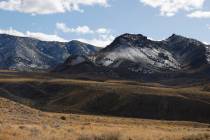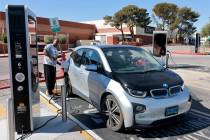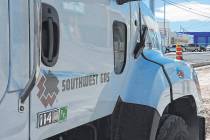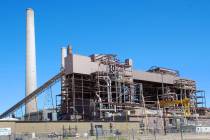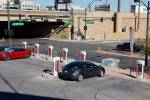Energy summit will help create jobs
While the Congress is in recess, important work goes on. The National Clean Energy Summit 2.0, which will be held in Las Vegas on Monday, will build on the two previous summits which were held in Las Vegas and in Washington, D.C. This year we will focus on how natural gas, wind, solar and other renewable sources of energy will positively impact jobs as we begin to emerge from the worst recession in decades.
With Nevada's unemployment rate above 12 percent, the state and the entire nation will be looking to the senior people at the summit for pointers on how clean energy can and will create good, new jobs which cannot be moved offshore.
The move to alternative energy sources, by definition, creates economic diversity. In small towns and cities all across the Great Plains wind farms are reversing decades of population loss; helping to build schools and renew downtowns. In Nevada and throughout the desert Southwest, actively pursuing solar farms will have a similar effect -- and the prospect of keeping young people from moving away by providing good schools and good jobs in their home towns is well worth the effort we are putting into renewable energy sources.
According to the Department of Energy, building out the energy potential in the Wind Corridor of the Great Plains would produce more than 3 million jobs over the next decade. A similar number would surely result from an aggressive effort to build out our solar capacity. Secretary of the Interior Ken Salazar has opened the first renewable energy coordination office in Nevada, and he has designated almost 700,000 acres in the West that could produce more than 100,000 megawatts of solar power.
For the past few years, we have sought to bring to the public's attention the astonishing percentage of oil we import each and every month, nearly 70 percent of which is used as gasoline for America's 250 million cars and light trucks and as diesel for our 6.5 million over-the-road heavy duty trucks. A recent study by the Gas Progress Committee has estimated we have some 2,000 trillion cubic feet of natural gas reserves in the continental United States. This gives us a seat at the global energy table and an opportunity to negotiate the price of oil down. As an energy supply, that means our natural gas reserves contain more energy than the oil in Saudi Arabia. In contrast, the United States has only about 3 percent of the world's proven oil reserves, an amount that may last less than 10 years at today's production rate, and OPEC will continue to set the world oil price far into the future.
There are bipartisan bills working their way through the House and Senate that will help us take advantage of these newly available natural gas reserves to significantly improve our energy and economic security: S.1408, the NAT GAS Act, is in the Senate and has four other co-sponsors -- two Democrats and two Republicans; and, the House companion, H.R. 1835, has 77 co-sponsors. These bills will expand and extend tax incentives that will encourage the manufacturing of natural gas vehicles here in America.
Right now, there are 10 million vehicles running on natural gas in the world but only about 146,000 of them are in the United States. This bill could provide a jump start for truckers who own and operate 18-wheelers to replace their vehicles running on imported oil with trucks running on domestic natural gas, and encourage fleet owners of all types to switch from oil to a domestic fuel. Natural gas is 50 percent cleaner than diesel and emerges from the ground at 130 octane, requiring no refining. A cleaner fleet will also help improve air quality in our ports and other polluted areas.
Congress has already made some progress on a Renewable Electricity Standard which will provide baselines and benchmarks for utilities to use in producing clean renewable energy and increasing investment in energy efficiency. That standard needs to be strengthened to maximize renewable energy production and job creation in this vital industry. Both the House and the Senate energy committees have acted on bills creating a Clean Energy Deployment Administration -- a Green Bank -- to fund the job-creating deployment of clean energy projects. And we have made a real start toward a 21st century transmission grid to get solar and wind energy from the rural areas where it is being produced to the population centers which it will be used.
We have the clean energy resources in America -- solar, wind, geothermal and natural gas -- to meet the challenges set by President Obama to reduce our dependence on foreign oil and make a safer future for our children. We have an important opportunity in this Congress to begin to make changes -- like those in the NAT GAS Act and in clean energy legislation -- because we know the people of the United States are ready to meet this challenge.
Harry Reid, a Nevada Democrat, is majority leader of the U.S. Senate and a co-sponsor of the NAT GAS Act. T. Boone Pickens is a former Texas oil and gas executive who now promotes the Pickens Plan, designed to reduce American dependence on foreign oil.








